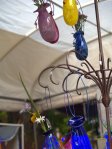It is now patently clear that I made the right choice in leaving, because returning to the place where I lived and taught this school year has precipitated a complete and utter meltdown. For starters, I am already on the low end of the serotonin spectrum because of my body’s natural cycle, and the 5-HTP is not helping as much as it had been for some reason. Being away from the friends I was re-meeting is apparently still traumatic enough to send me down a bad road. (It honestly took me about a week to calm down and realize that they weren’t going to disappear overnight.) Before I came back for the workshop, I joked that I didn’t want to come because I thought it would get me all excited about teaching again, when that is really not what I want to do.

Turns out I was partially right, except that I am not excited at all about the thought of going back to the classroom. I think that may be due to the fact that I don’t yet have a classroom to go back to, so the thought of preparing lesson plans that I mayl never use is just depressing. (I did that for a year already…it’s called grad school.) But on a more fundamental level, it feels like the light has gone out for me. I’ve wondered before whether I am too idealistic to be a teacher, and this year’s disappointments have been all but crushing.
Why didn’t I see this sooner? Self-imposed optimism is my response to the demands and expectations of others. When I feel like I must do something to win approval or meet expectations, I convince myself that it is simply a wonderful thing to do that I will enjoy immensely. This psychological self-adjustment is often powerful enough to change my perception of the task, and I gain enough comfort from knowing that I’ve done what I should do to offset the discomfort of the “should” itself. That was not the case this year, however, and even as it was liberating to let go of the mask, it is also excruciatingly difficult to expose my own insecurity and uncertainty.
And now I have no idea what the hell I’m doing.










